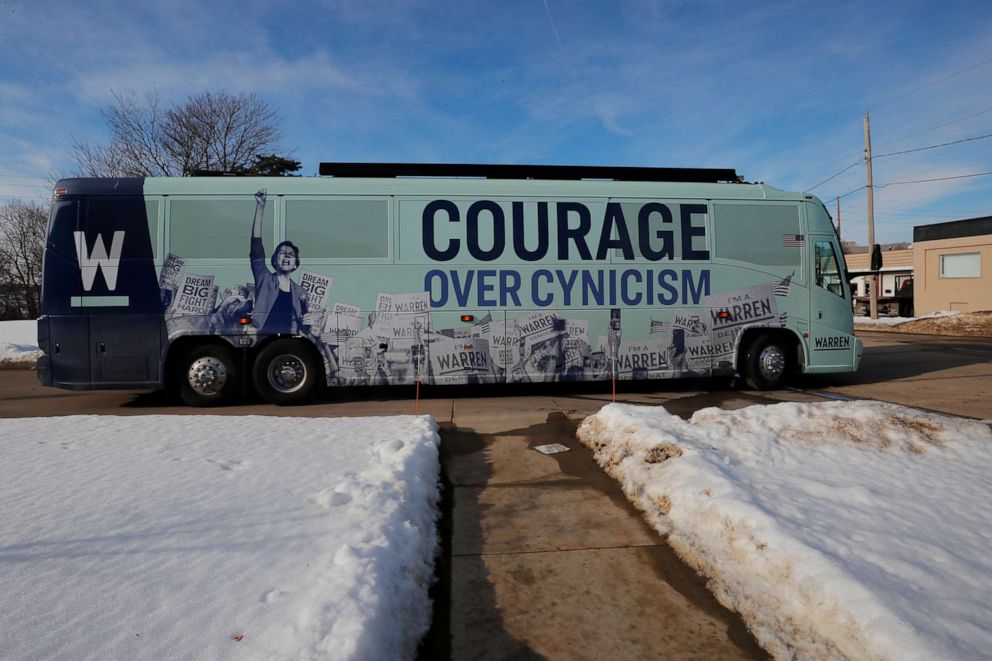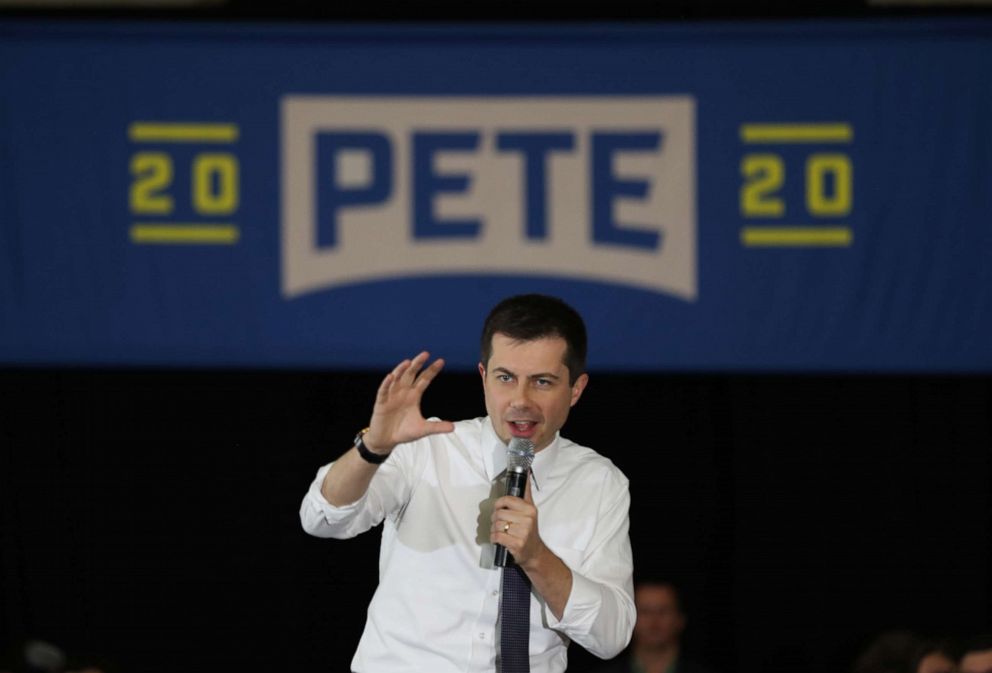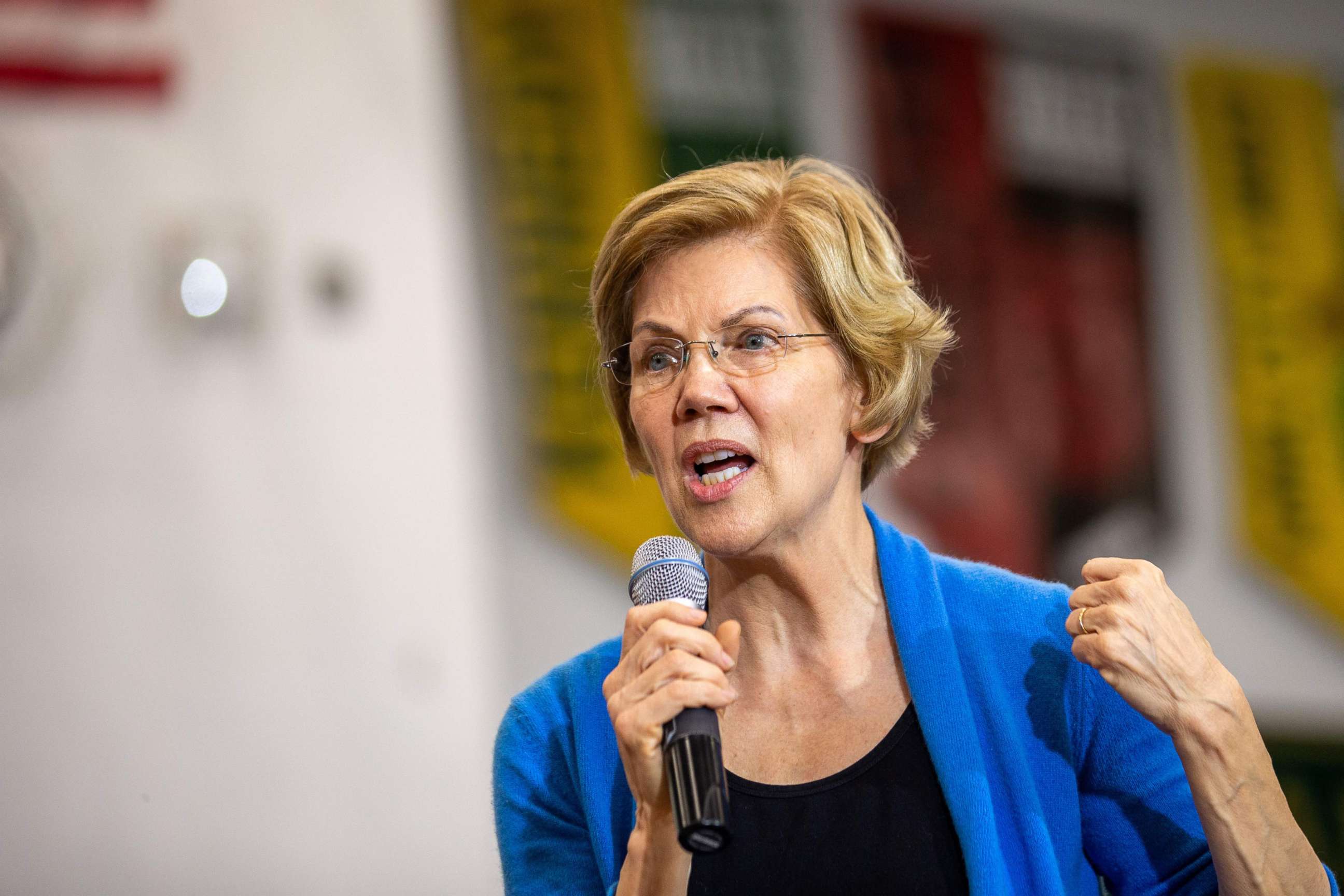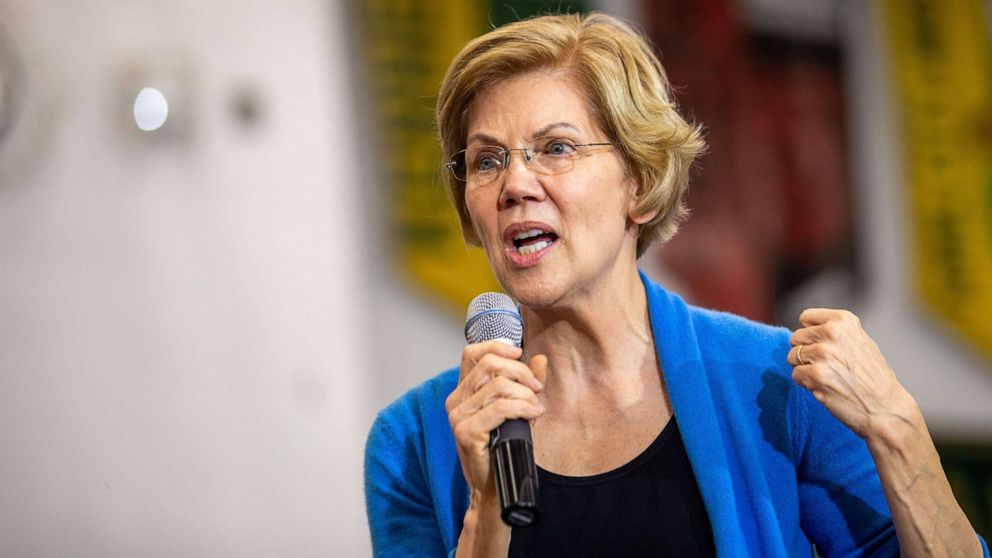Buttigieg bundlers say they've raised over $550,000 for Warren's past campaigns
Just days before the caucus in Iowa, the nation’s most-watched voters listened as Massachusetts Sen. Elizabeth Warren and former South Bend, Indiana, Mayor Pete Buttigieg, laid out their most memorable division ever since Warren’s line about “billionaires in wine caves” headlined the December debate: where they get their money and from whom.
Speaking at a forum, Warren made her case for eschewing big-dollar donors and bundlers — people she bluntly described as seeking access for cash. Not long afterward, Buttigieg took the stage to insist that wealthy donors deserve the same respect as any of the 700,000 people he says have given to his campaign.
But there hasn’t always been as much daylight in their campaign finance strategies — a point some donors who have given to Warren’s past campaigns have actively sought to make in recent months.
According to campaign finance records and conversations with more than a dozen donors who currently bundle money for Buttigieg and have said that in the past they have given to Warren, the same donors she now publicly criticizes raised more than $550,000 for her campaigns going back to 2011, including roughly $10,000 for her presidential campaign.
More than $140,000 of the $550,000 came from the bundlers’ own donations over the past decade, according to campaign finance records.
Bundler, a common term in campaign finance parlance, refers to wealthy donors who, after hitting the personal contribution limits, rally their social networks to deliver more money to the candidate in one large "bundle.”
Warren has consistently railed against the bundlers during her 2020 campaign, painting them as part of the corruption in politics that allows the system to work only for the wealthy and well-connected. And she has attacked Buttigieg, in particular, for engaging with the traditional fundraising system.
The former Warren bundlers and donors whom ABC News spoke with all support Buttigieg in 2020.
As compared to the total amount Warren raised for her Senate committee — which neared $78 million — $550,000 is a small number. It’s also a drop in the bucket compared to the $71 million Warren has raised in her 2020 presidential committee, which came from nearly one million people making more than 2.7 million donations, according to her campaign.
Nevertheless, the $550,000 further characterizes a very specific donor base: people whose money she has attacked her opponent for accepting.

Since the Warren campaign has never released the names of her past bundlers or the amount each bundler brought in during her Senate campaigns, the exact amount she received from them is unclear — partly due to the nature of bundling itself.
But some bundlers say they kept detailed receipts. Others said they tracked their amounts for their own accounting purpose based off how many people attended campaign fundraising events and how much was raised from the fundraisers they personally hosted.
ABC News has not independently reviewed those receipts or accounting documents from the donors detailing the money they claim they raised.
The largest combination of personal donation and bundling appears to come from Susie Tompkins Buell, the co-founder of Esprit and NorthFace and a San Francisco mega-donor, who bundled nearly $5 million for Hillary Clinton in 2016, according to her campaign’s records.
According to Buell's records, she says she bundled around $309,000 for Warren between 2012 and 2018, at least $20,000 of which came from her own donation.
Mega-donor Bryan Rafanelli, an influential Boston bundler who raised money for Hillary Clinton in 2016 and Barack Obama in 2012, said he raised $100,000 for Warren – including more than $30,000 of his own money, per campaign finance reports.
Now, however, Rafanelli, a high-end event planner who orchestrated Chelsea Clinton’s wedding, has put his organizational prowess behind Buttigieg. When he heard Warren’s criticism of Buttigieg for attending a fundraiser in a swanky Napa Valley wine cave, he said it felt personal.
"If she doesn't want him to raise money this way, I totally respect that," Rafanelli said. "But don't beat up everybody else for going out there and raising some serious money that she could have had in her bank account right now, but she doesn't."
But Gabby Hanna, a realtor in Provincetown, Mass., who hosted several fundraisers for Warren’s Senate campaigns and is now raising money for Buttigieg, says though she thinks Warren “could have chosen her words better,” it’s hard to call her hypocritical for trying to do “something different” with her presidential run.
Hanna, who bundled nearly $100,000 for Clinton in 2016, said looking back at the 2016 race, if Clinton hadn’t surrounded herself with big donors as much -- noting she is “as guilty as anybody for this” having raised a lot of money for her -- the election result might have been different.
Despite multiple attempts, several other high-dollar donors who have donated to both Buttigieg’s current campaign and Warren’s past campaigns could not be reached by ABC News.

Asked in December if the donations she received from bundlers over the years undermine her current message, Warren acknowledged that she used to run her campaigns differently.
In 2020, she’s working to “do better,” she said.
“It’s about trying to make this better. I’ve been in those fundraisers. I know what they’re like and I’m trying to be better,” Warren told ABC News at a campaign stop in Oklahoma City.
When she initially announced that she would ban closed-door fundraisers, she explained that it was because she was running in a competitive primary with other Democrats.
“The Democratic primary is the time when we get to make choices — and make a difference. Democrats deserve a chance to choose a nominee whose time is not for sale to people who can write big checks,” Warren wrote at the time.
Her campaign pointed out that she’s been consistent in her pledge since the onset of her presidential campaign.
“Elizabeth's message from day one has been that she is running for president to make our government work for everyone, not just for millionaires and billionaires who can influence politicians behind closed doors with max out donations,” Chris Hayden, deputy communications director for Warren’s campaign, told ABC News in a statement.
And Warren isn’t the only one in the 2020 Democratic field who has switched her fundraising approach.
Last year, the Buttigieg campaign pledged to return tens of thousands of dollars of contributions from lobbyists after joining a growing list of 2020 Democrats to pledge to not take in any lobbyist money. Former Vice President Joe Biden, who had previously rejected outside group help, has gradually embraced support from a super PAC spending millions in aid of him.
But some of the donors reached by ABC News echoed Buttigieg’s criticism that the money they raised for Warren during her senate campaigns may have cushioned her presidential bid.
“Senator, your presidential campaign right now as we speak is funded in part by money you transferred, having raised it at those exact same big-ticket fundraisers you now denounce,” Buttigieg said to Warren onstage in Los Angeles at the Democratic debate.
Warren transferred $10 million from her senate war chest to her presidential run at the beginning of her candidacy.
According to her campaign, though, Warren raised $20 million from grassroots donations during her 2018 re-election campaign — twice as much money as she transferred over to her senate fund — and nearly 80% of the donations were less than $25. She raised an additional $6 million from high-dollar fundraisers, her campaign said.
Nevertheless, the transfer was also frequently cited as an unfair advantage by former 2020 candidate California Sen. Kamala Harris, who dropped out in December because her campaign ran out of money.
"There's a candidate who came into the presidential race with 10 million dollars that she transferred in,” said Harris, two weeks before dropping out. “That's called start-up capital. I did not have that.”
But it was Buttigieg and Warren who went back-and-forth over campaign finance issues, particularly as Buttigieg neared Warren's place in the polls. It culminated in Warren's direct attack on Buttigieg's donors on the debate stage, when she said that "billionaires in wine caves shouldn't pick the next president of the United States."
Rafanelli’s name, along with the names of another 112 Buttigieg bundlers — classified by the campaign as top-donors who brought in over $25,000 — were made public shortly before, after a weeks-long call from Warren for the mayor to “reveal” who was giving to his campaign.

According to campaign finance reports, 20 people from that list have personally given donations to Warren’s 2012, 2018 or 2020 campaigns. Seven people have bundled for Warren’s past campaigns, according to conversations with the donors and multiple sources who confirmed the range they estimated.
Laurie David, Oscar-winning producer of “An Inconvenient Truth” and former wife of Seinfeld co-creator Larry David, donated $10,400 to Warren's Senate races, according to campaign finance records.
During the 2020 primary, she has held four fundraisers for Buttigieg, including one at a high school where the cheapest ticket price was $15. She cited the low-dollar threshold as evidence that he’s “providing access to a whole range.”
“I don't know how else you run for president of the United States without fundraising, unless you're a billionaire like Tom Steyer or Michael Bloomberg," David said.
Many of the donors who donated to Warren and now bundle for Buttigieg are part of the highest echelons of Democratic fundraising, having supported numerous campaigns throughout the years. They’re used to supporting a cast of Democrats who might eventually butt heads with each other. But they’re not used to being targets in the fight.
"The last I looked at America, people aspired to being successful. And sometimes one of the measures of success is wealth. Why are we denigrating people who've been successful and have made money … and villainizing them?" David said.
Buell, who said she raised $309,000 for Warren, called it “unfortunate” because “everybody does it” and “it's all above board.”
"It's a problem when anybody goes after anybody else,” said Agnes Gund, a New York City philanthropist and art collector who has written Warren checks totaling $4,000 for her senate runs.
She told ABC News she recently co-hosted a $100,000 fundraiser for Buttigieg.
But despite the frustration, each of the Warren-donors-turned-Buttigieg-bundlers said they would all support Warren — and fundraise for her — if she were to be the nominee.
“If she was the candidate, I would. I mean that's what we do. We're going to get behind whoever's the candidate,” Buell said.




